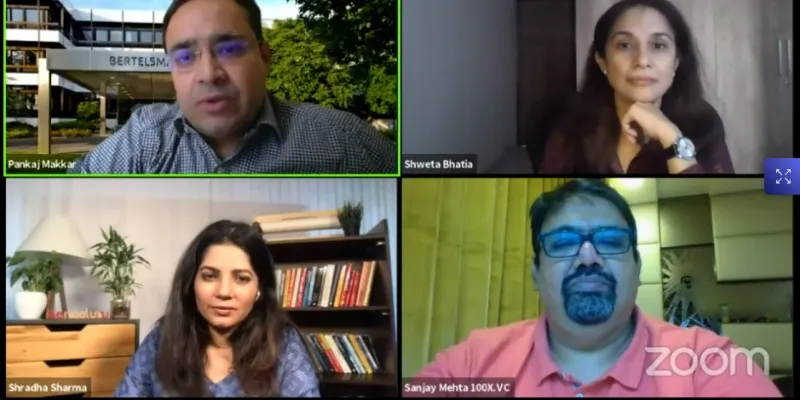[TechSparks 2020] VCs discuss the power of gross margins to build profitable startups
During a roundtable at TechSparks 2020, venture capitalists were of the opinion that startup founders need to deploy capital in a judicious manner to build a sustainable business in the long run.
The COVID-19 pandemic has served as a wakeup call for the Indian startup ecosystem as the focus has now veered towards profitability, sustainability, and the spotlight is on startups which build resilient business models.
During a roundtable discussion on the topic “Think local, go global: Investing in world-class innovations emerging from India” at TechSparks, YourStory’s flagship event, leading venture capitalists in the country were unison on one point - that capital needs to be respected.
The panel included Shweta Bhatia, Partner & Head of Tech Investments for Eight Roads Ventures India; Sanjay Mehta, Founder & Partner, 100X.VC; and Pankaj Makkar, Managing Director, Bertelsmann India Investments. It was moderated by Shradha Sharma, Founder and CEO, YourStory.
During the discussion, Pankaj said, “The power of gross margin is very important.”

Panelists at the round table (clockwise from top left), Pankaj Makkar, Managing Director, Bertelsmann India Investments, Shweta Bhatia, Partner & Head of Tech Investments, Eight Roads Ventures, India, Sanjay Mehta, Founder & Partner, 100X.VC and Shradha Sharma, Founder & CEO, YourStory
He elaborated on this point and said how they want entrepreneurs to think seriously about the gross margins in their business as this is the biggest driver for creating a sustainable business model.
Prior to the pandemic, there was a rush of capital into the Indian startup ecosystem, which created a certain imbalance, with many of the B2C entities burning considerable amount of cash.
Sanjay Mehta, Founder & Partner, 100x.VC, said, “Founders who understand finance and deploy capital sensibly are the ones who will remain profitable.”
On a lighter note, Sanjay also talked about the Rule of 40, where if a company is growing at 100 percent, then one can burn money up to 60 percent.
However, this is also a challenging task for startup founders as they need to deploy large amounts of capital to acquire market share, and failing to do so may slow down the growth rates.
Shweta Bhatia of Eight Roads Ventures India was of the opinion that it is not an easy balance to strike when the founders are looking to build large businesses from a relatively smaller size.
“Founders need to keep the board and investors aligned, and then be honest with themselves as this requires both short term and long term goals,” she said.
The venture capitalists were of the view that startup founders need to remain sharply focused on what will be their specific goals in terms of market share and network effect, and work towards reaching that goal, which could include burning significant cash.
“Startups need to define their goal and what will be the significant strategic advantages from them,” said Pankaj.
As the startup ecosystem in India evolves, there is also a greater focus on the ‘Bharat’ as startups and businesses are placing stronger bets on Tier II and III locations. In fact, the recent festive sale by ecommerce companies like Amazon and Flipkart highlighted the strong growth they experienced from these locations.
However, this seems to be easier said than done even though the consumption patterns are changing in the Bharat market, where smartphones have emerged as the big access point.
“We are quite hopeful of the Bharat market as COVID-19 has accelerated many things, and people are picking up many things digitally,” said Sanjay.
However, Pankaj was more cautious in his assessment of this market.
“It is a great story, but creating the right business model that will be profitable and monetising it is going to be a challenge,” he said.
On the other hand, Shweta said there are many entrepreneurs who have proved the investor community wrong as they have displayed very sharp insights on the pain point of consumers in these markets and how to solve them.
Despite the pandemic environment and a general slowness, the three VCs agreed upon one thing that this was the best time to become an entrepreneur as there was enough white space available to start new ventures.
Edited by Megha Reddy


![[TechSparks 2020] VCs discuss the power of gross margins to build profitable startups](https://images.yourstory.com/cs/2/220356402d6d11e9aa979329348d4c3e/TS-panel-1603981303497.jpeg?mode=crop&crop=faces&ar=2%3A1&format=auto&w=1920&q=75)
![[TechSparks 2020] Dream is for India to hit a billion digital transactions a day, says NPCI's Dilip Asbe](https://images.yourstory.com/cs/2/a0bad530ce5d11e9a3fb4360e4b9139b/256febe7-551d-4cbd-9be5-f540f11112bc-1603959837939.jpg?fm=png&auto=format&h=100&w=100&crop=entropy&fit=crop)




